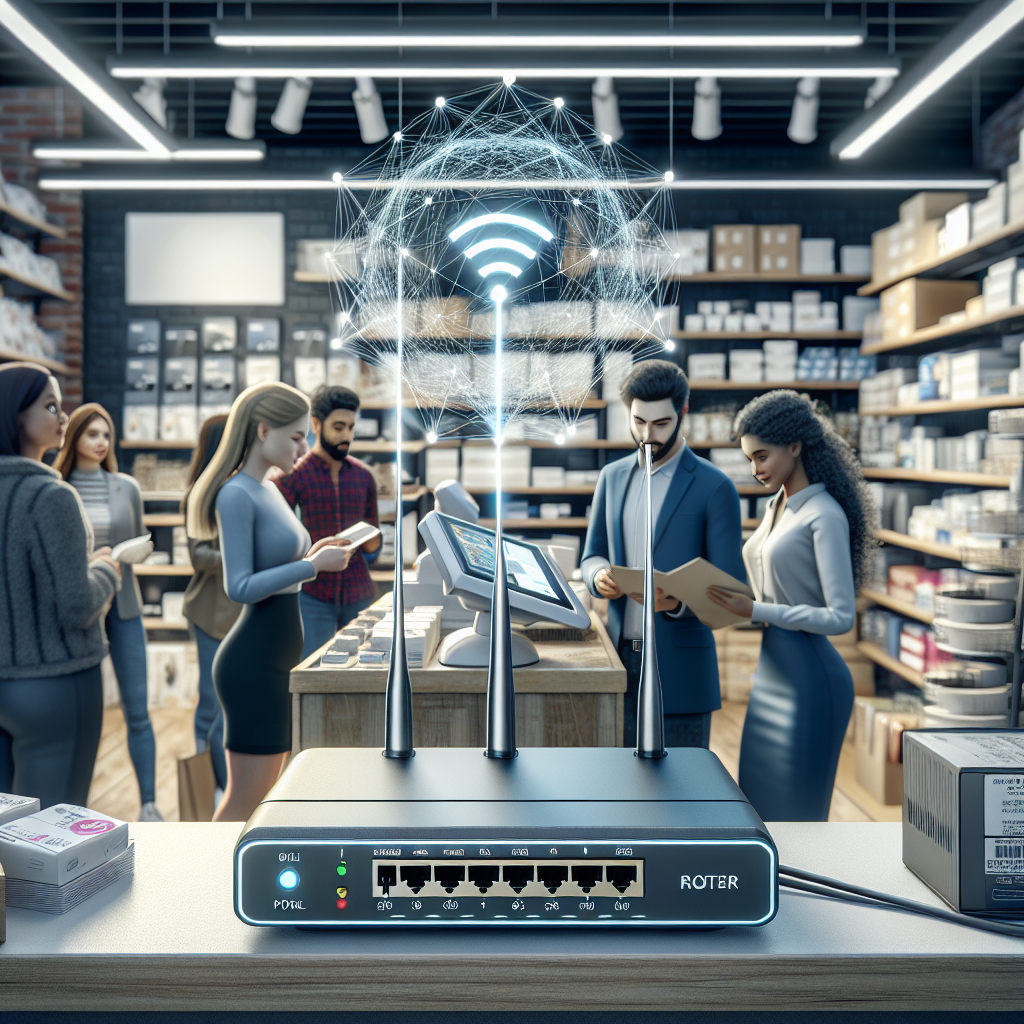In today’s digital age, the success of any business, big or small, hinges on efficient and reliable internet connectivity solutions for their point of sale systems. These systems are the lifeblood of retail establishments, allowing seamless transactions, inventory management, and customer data capture. From traditional wired connections to cutting-edge wireless solutions, businesses have a plethora of options to ensure their POS systems are always up and running. In this article, we will explore the importance of internet connectivity for POS systems and delve into the different solutions available to businesses to keep their operations running smoothly.
Understanding the Importance of Reliable Internet for Point of Sale Systems

In the realm of retail and hospitality industries, the smooth functioning of Point of Sale (POS) systems is paramount for efficient operations and customer satisfaction. The intricate network of transactions, inventory management, and customer data processing hinges on the stability and reliability of internet connectivity. Here’s a closer look at why reliable internet is crucial for POS systems:
-
Impact of internet connectivity on POS systems
-
The modern POS system is intricately connected to the internet for real-time data processing, updates, and communication with servers or cloud-based services.
- Uninterrupted internet connectivity ensures swift processing of transactions, accurate inventory management, and seamless integration with other business applications.
-
In the absence of reliable internet, POS systems may experience lags in transaction processing, leading to delays, errors, and potential loss of sales.
-
Dependence of POS operations on stable internet
-
POS systems rely heavily on internet connectivity for various functions such as processing credit card payments, updating product information, and syncing data across multiple devices.
- A stable internet connection is essential for POS systems to communicate with payment processors securely and quickly, ensuring smooth transactions.
- Furthermore, cloud-based POS systems necessitate constant internet access for real-time updates, data backups, and remote management.
Challenges of Poor Internet Connectivity for Point of Sale Systems
-
Disruption in transaction processing: When a Point of Sale (POS) system experiences poor internet connectivity, it can lead to disruptions in transaction processing. This can result in delays and errors in completing sales transactions, leading to frustrated customers and lost sales opportunities. Additionally, downtime in transaction processing can impact inventory management and revenue tracking, creating operational inefficiencies for businesses.
-
Risk of data loss and security breaches: Poor internet connectivity for POS systems can pose significant risks in terms of data security. Without a reliable connection, there is a higher likelihood of data loss during transactions, which can result in financial losses and damage to the reputation of the business. Moreover, inadequate internet connectivity increases the vulnerability of POS systems to security breaches, exposing sensitive customer information to potential cyber threats and fraud.
-
Negative impact on customer experience: A key challenge of poor internet connectivity for POS systems is the negative impact it can have on the overall customer experience. Slow transaction processing, frequent errors, and system crashes due to unreliable internet connections can lead to long wait times and dissatisfaction among customers. This can tarnish the reputation of the business and discourage repeat business, ultimately affecting customer loyalty and profitability.

Wired Internet Solutions for Point of Sale Systems
In the realm of Point of Sale (POS) systems, the reliability and speed of internet connectivity play a crucial role in ensuring seamless transactions and operational efficiency. Wired internet solutions offer a robust and stable connection that is particularly well-suited for POS environments where uninterrupted communication is paramount.
Ethernet connections for stable connectivity
-
Ethernet cables: Utilizing Ethernet cables to connect POS systems to the internet provides a direct and secure link that minimizes the risk of interference or signal disruptions. This hardwired connection offers consistent bandwidth and low latency, ideal for processing transactions swiftly and accurately.
-
Reliability: Ethernet connections are known for their reliability, offering a dependable network link that is less susceptible to environmental factors or wireless interference. This stability is essential in POS settings where any downtime or connectivity issues can result in lost sales opportunities and customer dissatisfaction.
-
Security: Wired connections via Ethernet cables enhance the security of POS systems by reducing the likelihood of data breaches or unauthorized access. The physical nature of the connection makes it harder for cyber threats to intercept sensitive information during transactions, safeguarding both customer data and business operations.
Benefits of wired connections in POS environments
-
Speed: Wired internet solutions typically deliver faster data transfer speeds compared to wireless alternatives, enabling POS systems to process transactions swiftly and efficiently. This rapid communication is essential for maintaining a smooth checkout process and preventing delays that could impact customer satisfaction.
-
Consistency: With a wired connection, POS systems can maintain a consistent and stable internet connection throughout the day, regardless of fluctuations in network traffic or signal strength. This reliability ensures that transactions can be completed without interruptions or delays, enhancing overall operational efficiency.
-
Compliance: In certain industries, such as retail or hospitality, compliance requirements mandate the use of secure and reliable internet connections for POS systems. Wired solutions offer a compliant option that meets industry standards for data protection and transaction security, helping businesses adhere to regulatory guidelines and avoid potential penalties.
Wireless Internet Solutions for Point of Sale Systems
In the realm of Point of Sale (POS) systems, wireless internet solutions offer a host of advantages, particularly in terms of flexibility and convenience. Let’s delve into the specifics of utilizing Wi-Fi for POS operations.
- Advantages of Wi-Fi for flexibility in POS setup
Wireless internet connectivity allows for greater mobility within a retail or hospitality environment. It enables POS terminals to be easily moved or repositioned as needed, facilitating efficient customer service and operational flexibility. With Wi-Fi, businesses can adapt their POS setup based on traffic flow or specific operational requirements without being constrained by wired connections.
- Considerations for secure wireless connections
While the flexibility of Wi-Fi is advantageous, it is crucial to prioritize the security of wireless connections in POS systems. Implementing robust encryption protocols, such as WPA2, and regularly updating network security measures are essential to safeguard sensitive transaction data. Additionally, businesses should segment their Wi-Fi network to isolate POS devices and prevent unauthorized access to critical information.

By embracing wireless internet solutions for POS systems, businesses can enhance operational efficiency and customer service while ensuring the security of transaction data.
Satellite Internet Solutions for Point of Sale Systems
Satellite internet technology offers a viable solution for ensuring reliable internet connectivity for Point of Sale (POS) systems, especially in remote locations where traditional broadband options may not be readily available.
Overview of satellite internet technology
Satellite internet operates by utilizing communication satellites in geostationary orbit to provide internet access to users on Earth. This technology allows POS systems to connect to the internet via signals transmitted to and from satellites, bypassing the need for landline infrastructure.
One key component of satellite internet technology is the satellite dish, which is installed at the POS location to send and receive data signals to and from the satellite. The dish communicates with the satellite to establish a high-speed internet connection, enabling POS systems to process transactions efficiently.
Benefits of satellite internet for remote POS locations
-
Global Coverage: Satellite internet offers global coverage, making it an ideal solution for POS systems operating in remote or rural areas where traditional internet infrastructure is limited or non-existent.
-
Reliability: Satellite internet provides a reliable connection for POS systems, ensuring continuous operation even in areas prone to service disruptions or outages.
-
High Speeds: Despite being located in remote locations, satellite internet can deliver high-speed connectivity to POS systems, facilitating fast and seamless transaction processing.
-
Scalability: Satellite internet solutions can be easily scaled to accommodate the growing needs of POS systems, making it a flexible option for businesses looking to expand their operations.
Overall, satellite internet technology presents a robust and dependable internet connectivity solution for Point of Sale systems operating in remote locations, enabling businesses to streamline their transactions and enhance customer service.
Factors to Consider When Choosing Satellite Internet for POS Systems
When selecting satellite internet as a connectivity solution for point of sale (POS) systems, there are several crucial factors that must be taken into account to ensure seamless operations and reliable transactions.
- Bandwidth requirements for POS transactions
- Satellite internet services typically offer various bandwidth options, ranging from basic to high-speed plans. It is essential to assess the specific bandwidth requirements of the POS system to support simultaneous transactions, data processing, and communication with servers.
-
Analyzing peak usage times and the volume of transactions can help determine the optimal bandwidth needed to prevent delays or interruptions in POS operations.
-
Reliability and latency considerations in satellite internet
- One of the primary concerns with satellite internet is latency, which refers to the delay in data transmission due to the distance signals travel between the satellite and the POS system. High latency can impact transaction processing times and overall system performance.
- Evaluating the reliability of the satellite internet provider is crucial to ensure consistent connectivity and minimal downtime. Factors such as service level agreements (SLAs), uptime guarantees, and customer support responsiveness should be carefully assessed before choosing a satellite internet service for POS systems.
Future Trends in Internet Connectivity for Point of Sale Systems
Advancements in 5G technology for POS connectivity
- 5G technology, the next generation of mobile internet connectivity, is set to revolutionize the way Point of Sale (POS) systems interact with the internet.
- The high-speed and low-latency capabilities of 5G networks will enable POS systems to process transactions faster and more efficiently than ever before.
- With 5G’s increased bandwidth, POS systems can handle complex data transfers, such as processing large volumes of transactions and transmitting real-time analytics.
- Enhanced security features of 5G networks will provide POS systems with a more secure connection, reducing the risk of data breaches and fraud.
Integration of IoT devices in POS systems for enhanced internet capabilities
- Internet of Things (IoT) devices are increasingly being integrated into POS systems to enhance internet connectivity and functionality.
- By connecting IoT devices, such as inventory sensors and smart payment terminals, to POS systems, businesses can automate inventory management and streamline the checkout process.
- The integration of IoT devices allows POS systems to collect real-time data on inventory levels, customer preferences, and sales trends, enabling businesses to make informed decisions and improve operational efficiency.
- Enhanced communication between IoT devices and POS systems enables businesses to offer personalized promotions and loyalty programs based on customer behavior and preferences.
The Role of Cloud-Based Solutions in POS Internet Connectivity
Cloud-based solutions play a crucial role in ensuring reliable internet connectivity for Point of Sale (POS) systems. These innovative technologies offer a range of benefits that enhance the efficiency and effectiveness of POS operations.
- Benefits of cloud-based POS systems in internet reliability
Cloud-based POS systems operate using remote servers hosted on the internet, providing a reliable connection that is not dependent on local network stability. This ensures that transactions can be processed seamlessly without disruptions caused by internet outages or downtimes. By leveraging the power of the cloud, POS systems can maintain continuous connectivity, enabling businesses to serve customers efficiently and effectively.
- Scalability and flexibility offered by cloud-based POS solutions
Cloud-based POS solutions offer scalability and flexibility, allowing businesses to easily expand their operations and adapt to changing market demands. With cloud technology, businesses can quickly add new devices or locations to their POS network without the need for extensive hardware installations or manual configurations. This scalability ensures that businesses can grow without being limited by their POS system’s internet connectivity capabilities. Additionally, cloud-based POS solutions provide flexibility in terms of accessing real-time data and analytics from any location with an internet connection, enabling business owners to make informed decisions on the go.
In conclusion, cloud-based solutions play a pivotal role in enhancing internet connectivity for POS systems, offering reliability, scalability, and flexibility that are essential for modern businesses. By leveraging cloud technology, businesses can ensure seamless transactions and optimize their POS operations for improved customer satisfaction and operational efficiency.
FAQs: Internet Connectivity Solutions for Point of Sale Systems
What are the different types of internet connectivity solutions available for point of sale systems?
There are several types of internet connectivity solutions available for point of sale systems, including Ethernet, Wi-Fi, and Cellular. Ethernet connections are ideal for high-speed and stable internet access, while Wi-Fi is convenient for locations where wired connections are not feasible. Cellular connectivity is a good option for businesses on the go or in remote locations where traditional internet connections may not be available.
How do I choose the right internet connectivity solution for my point of sale system?
When choosing an internet connectivity solution for your point of sale system, consider factors such as the location of your business, the speed and reliability of the connection, and any security requirements. If you have a fixed location, Ethernet may be the best option. If you need flexibility or are in a remote area, consider Wi-Fi or Cellular options.
Can I use a combination of internet connectivity solutions for my point of sale system?
Yes, depending on your business needs, you can use a combination of internet connectivity solutions for your point of sale system. For example, you could use Ethernet as your primary connection with a backup Wi-Fi or Cellular connection in case of emergencies or internet outages. This can help ensure that your point of sale system remains operational and your business can continue to process transactions smoothly.